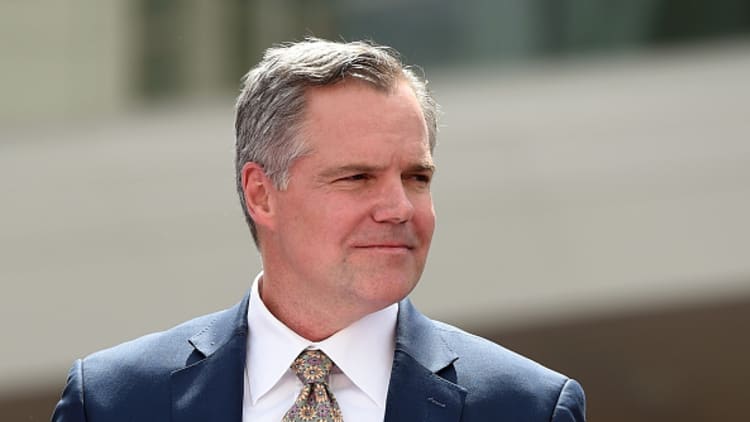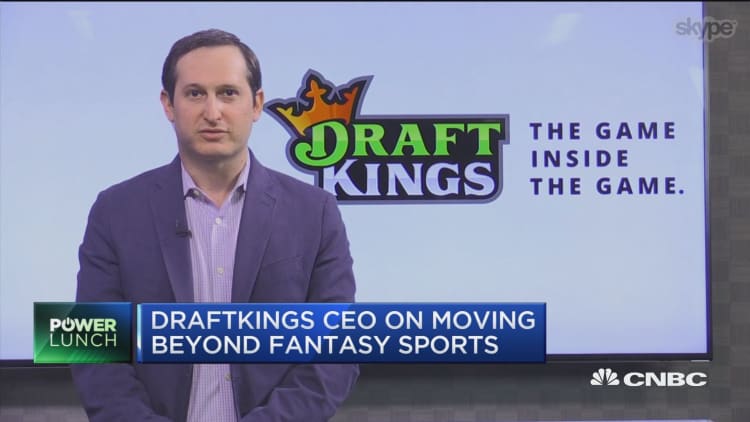The day that many sports fans and gamblers have been waiting for is here. Nevada's monopoly on legal sports betting will come to an end after the U.S. Supreme Court voided the Professional and Amateur Sports Protection Act, a federal law which prevented states from making individual decisions on matters such as the legalization of sports betting.
The U.S. arm of Britain-based sportsbook operator William Hill intends to offer sports betting in New Jersey locations as "soon as responsibly possible," according to Joe Asher, CEO of William Hill US. "We're thinking in the realm of weeks."
MGM Resorts International CEO Jim Murren told CNBC on Monday that it will be able to offer sports betting around the country "very quickly."
"We have already established the architecture to deploy sports betting as soon as the states allow us to do that," Murren said. "We have already the software. We have our mobile app called PlayMGM that is already activated in Nevada."

Many casino stocks popped on the news, including MGM, and major sports team owners like Dallas Mavericks owner Mark Cuban said on Monday that the decision will increase team values by as much as double. But professional sports leagues are among the significant parties that still have major questions about how the legalized gambling rollout occurs across the states.
Here are a few of the biggest decisions yet to be figured out as states move to offer legalized sports bets.
1. How much do the pro sports leagues get paid?
Leagues including the National Basketball Association and Major League Baseball initially pushed for a 1 percent integrity fee, though the amount they'll receive, if any, is likely to be slightly less and could differ on a state-by-state basis. New York state recently proposed a 0.25 percent integrity fee as part of legalized sports legislation. West Virginia has said it won't pay a fee to the leagues at all.
The NBA and other leagues have defended their reasoning for the fee as a need to police the game from criminals looking to fix games, and implement compliance systems across their leagues. The NBA maintained this stance after the U.S. Supreme Court ruling.
"We will remain active in ongoing discussions with state legislatures. Regardless of the particulars of any future sports betting law, the integrity of our game remains our highest priority," NBA Commissioner Adam Silver said in a written statement.
Critics of the fee argue that the leagues are hurting the potential sports betting business because the legal bookmakers won't be able to compete with the underground market if you decrease the margins.

Asher said on a conference call after the court decision that moving bettors to the legal marketplace could be a difficult feat. He said illegal bookmakers have "structural advantages," and that's not only limited to the lack of league integrity fees.
Those books do not pay taxes and they don't have to deal with the compliance issues that regulated books will have. Asher said that states with high tax rates, such as Pennsylvania will find it difficult to compete with the underground market. Pennsylvania is a high tax state for existing gambling operations, and it's expected to treat sportsbooks similarly.
States are hoping to generate a new significant source of revenue from gambling businesses.
"Illegal bookies in Philadelphia and Pittsburgh could hypothetically give bettors a 25 percent rebate on losses and still be better off than the legal bookmakers," Asher said during the conference call with select media members, including CNBC, on Monday. "It's not as if the bookies are out today shopping for new careers."
Geoff Freeman, CEO of the American Gaming Association, is confident that the illegal market will be put out of business but says that it's going to take a partnership from the leagues. He said states structuring their legislation don't "need to reinvent the wheel."
"We have a functioning market and I hope [the states] look at what we have in Nevada," Freeman said on a conference call with the media Monday.
Currently, there is no integrity fee or tax written into any legislation anywhere in the U.S.
"No integrity tax currently in any of these states," Asher said. "[There's] never been an integrity tax in Nevada, no requirement to use league source data. That doesn't exist in Nevada."
Asher added that the integrity fee is not something William Hill believes is warranted.
"There is plenty of money to be made by the professional sports leagues without an integrity tax," Asher said. "They are going to be big winners throughout this for sure."
2. Will there be a federal framework?
The NFL, like the other North American sports leagues, wants to protect the integrity of the game, but it hopes that Congress hands down a "core regulatory framework" for legalized betting as part of the effort to do so.
"The NFL's long-standing and unwavering commitment to protecting the integrity of our game remains absolute," NFL spokesman Brian McCarthy told CNBC via email.
"Congress has long-recognized the potential harms posed by sports betting to the integrity of sporting contests and the public confidence in these events. Given that history, we intend to call on Congress again, this time to enact a core regulatory framework for legalized sports betting. We also will work closely with our clubs to ensure that any state efforts that move forward in the meantime protect our fans and the integrity of our game."
The NBA also touched upon a federal structure in its statement on the Supreme Court's ruling. "We remain in favor of a federal framework that would provide a uniform approach to sports gambling in states that choose to permit it, but we will remain active in ongoing discussions with state legislatures," NBA Commissioner Silver stated.
Freeman can't envision a national approach to regulating sports betting, calling it "extremely unlikely."
"America long ago decided that gaming would be regulated on a state-by-state basis and I'm not sure how you're going to bring the federal government in here to tell the states what to do given that the states hold such great authority over betting." Freeman said, while adding that states have "proven to be effective regulators."
3. When will you be allowed to bet?
New Jersey appears to be weeks away from offering sports bets.
Freeman of the American Gaming Association said he has heard rumors that the state will have wagering available by the start of the NBA Finals, which begin May 31. In the least, he expects many states to be up and running for the upcoming NFL season.
William Hill would like to offer bets in New Jersey in advance of a potential NBA Finals rematch between the Cleveland Cavaliers and Golden State Warriors. The summer is a historically slow sports betting period and having available action on the NBA series would be a lucrative venture. Still, Asher reiterates that the company "wants to be responsible about it." The company hopes to begin operations in other states by the time August rolls around.
"We clearly want to be open in advance of football season," Asher said. "We want to train staff and give them exposure to handling customers."
WATCH: Leagues expect to get something, says Draftkings CEO



